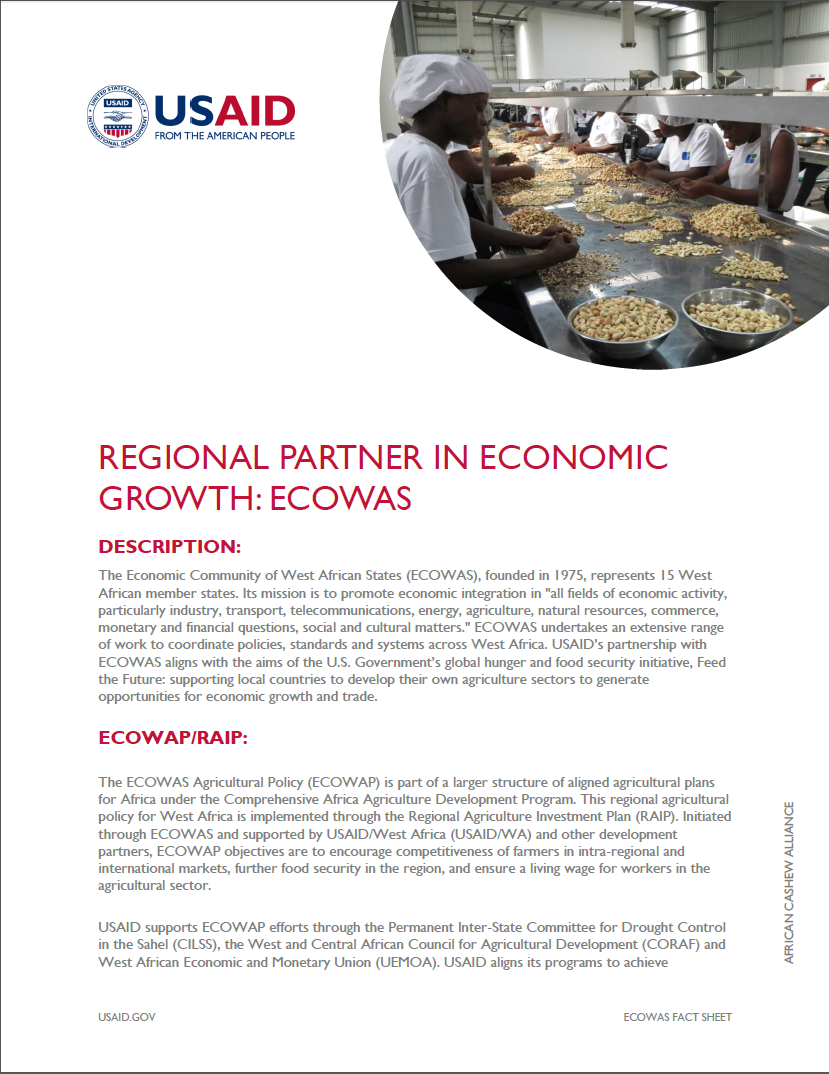Speeches Shim
Regional Partner in Economic Growth: ECOWAS ![]() (pdf - 215k)
(pdf - 215k)
Description:
The Economic Community of West African States (ECOWAS), founded in 1975, represents 15 West African member states. Its mission is to promote economic integration in "all fields of economic activity, particularly industry, transport, telecommunications, energy, agriculture, natural resources, commerce, monetary and financial questions, social and cultural matters." ECOWAS undertakes an extensive range of work to coordinate policies, standards and systems across West Africa. USAID’s partnership with ECOWAS aligns with the aims of the U.S. Government’s global hunger and food security initiative, Feed the Future: supporting local countries to develop their own agriculture sectors to generate opportunities for economic growth and trade.
ECOWAP/RAIP:
The ECOWAS Agricultural Policy #ECOWAP) is part of a larger structure of aligned agricultural plans for Africa under the Comprehensive Africa Agriculture Development Program. This regional agricultural policy for West Africa is implemented through the Regional Agriculture Investment Plan (RAIP). Initiated through ECOWAS and supported by USAID/West Africa (USAID/WA) and other development partners, ECOWAP objectives are to encourage competitiveness of farmers in intra-regional and international markets, further food security in the region, and ensure a living wage for workers in the agricultural sector.
USAID supports ECOWAP efforts through the Permanent Inter-State Committee for Drought Control in the Sahel (CILSS), the West and Central African Council for Agricultural Development (CORAF) and West African Economic and Monetary Union (UEMOA). USAID aligns its programs to achieve ECOWAP priorities by incorporating nutrition, risk management, climate change and resilience into the ECOWAP framework. USAID/WA helps build capacity to advocate for policies encouraging agricultural intensification, market regulation and social safety nets.
USAID/WA Support to ECOWAS Trade Efforts:
ECOWAS fosters economic growth and poverty reduction through decreasing regional barriers to trade, such as impediments to goods crossing borders, inefficient transport corridors, and lack of access to power. It also works to standardize trade and border policy in all member countries. The ECOWAS Trade Liberalization System (ETLS), approved in 1979 to create a West Africa free trade zone, has yet to be fully implemented. USAID/WA provides direct support to the newly created ETLS taskforce in its efforts to push member states to fully implement ETLS protocols.
USAID/WA helps ECOWAS to implement its trade programs through several initiatives: the West Africa Trade & Investment Hub is conducting a Corridor Management Study, the results of which will support the ECOWAS Corridor Development and Management Strategy and Action Plan; the Food Across Borders Program improves food security and economic growth by increasing the volume and value of intra-regional agricultural trade, contributing to an integrated common market; and the Borderless Alliance supports ECOWAS’ trade efforts to remove regional border constraints to trade.
USAID/WA directly supports ECOWAS with technical expertise in monitoring and implementation of trade facilitation initiatives, and also advancing regional standards harmonization. USAID/WA also helps ECOWAS to achieve its goals by working closely with truckers to report on road corruption along eight major trade corridors, and conduct studies on legal practices in order to assess constraints to trade and collect evidence to use for advocacy. It uses this information to improve road governance and increase the volume of trade along West African corridors.
Environmental Policy:
USAID/WA is helping to implement the ECOWAS Environmental Policy (ECOWEP) by strengthening the organizational and technical capacities of the Environment Directorate. USAID/WA works with the Directorate to assist member countries to harmonize forest policies and track progress on meeting their biodiversity and climate change commitments, and establish frameworks for engaging the private sector more productively to improve the region’s natural resources management. Through inter-agency cooperation, USAID/WA is able to leverage assistance for ECOWEP from the U.S. Fish and Wildlife Service, U.S. Environmental Protection Agency, National Oceanic and Atmospheric Administration, U.S. Geological Survey, and the U.S. Forest Service.
Energy:
USAID/WA supports the West African Power Program (WAPP) in their efforts to improve West Africa’s energy supply by assisting WAPP to coordinate and commission the construction of transmission lines, develop market rules, and build operational capacity to enable multi-country energy trading by 2020. In the realm of renewable energy and energy regulations, USAID/WA will support the ECOWAS Center for Renewable Energy and Energy Efficiency (ECREEE) to develop commercially viable clean energy (wind, solar and biomass) energy projects for ECOWAS member governments, and will collaborate with the ECOWAS Regional Electricity Regulatory Authority (ERERA) to launch and regulate the regional electricity market.
---
ECOWAS Member Countries:
Benin, Burkina Faso, Cape Verde, Cote d’Ivoire, Gambia, Ghana, Guinea, Guinea Bissau, Liberia, Mali, Niger, Nigeria, Senegal, Sierra Leone, and Togo.


Comment
Make a general inquiry or suggest an improvement.